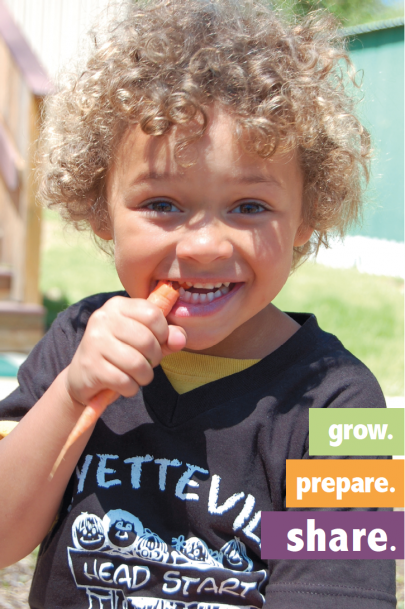Cultivating Nutrition Together
Study after study ranks Arkansas consistently in the top five states for food insecurity in the United States. Feeding America, the nation’s largest organization of emergency food providers, reports that one in six Americans faces hunger. The Food Research and Action Center (FRAC) released a study in September, 2013, that shows between 2010 and 2012 one in three Arkansas households with children reported instances in the prior year when there was not enough money to buy food for the family.
In 2010, Arkansas Governor Mike Beebe decided it was time to address the issue of child hunger in Arkansas. He brought together people from all over the state who represented the many relevant social service agencies that serve the needs of low-income Arkansans. He dedicated a staff member to the issue, and organized a coalition of partners, led by Share Our Strength, No Kid Hungry, and the Arkansas Hunger Relief Alliance. In attendance at the Governor’s meeting was Denise
Garner, a Fayetteville resident known for her community engagement and active involvement in social justice issues. Garner recalls that she believed she was going to the capital to discuss hunger in the Arkansas Delta, often cited as the state’s poorest region. What she learned, however, was that Washington and Benton counties have more hungry children than any other region in the state.
The problem of food insecurity in our own backyard had been identified, but the solution would require a long-term commitment and strategic thinking from every component of the food system. Garner gathered a number of farmers, restaurant owners, and non-profit leaders to discuss creating a food rescue and gleaning program. That group quickly identified many of the reasons so many people had limited access to healthy foods, which included cost, lack of education, and lack of skills in preparing healthy foods. Garner says, “It was obvious that we needed a whole lot more than food rescue.”
Garner decided to hold a stakeholder meeting in August, 2011, where 75 people came together to discuss ways they could collaborate to feed Fayetteville. That effort would quickly become the organization Feed Fayetteville with a mission to “alleviate hunger and create community food security by cultivating a sustainable food system.” Many local organizations and churches already provided emergency food programs, but Garner and the other stakeholders recognized how much duplication and overlap existed across all of these programs. She says, “I realized that the way we could help most was through coordination and collaboration of those organizations already going in the same direction but on different paths It made sense to work from the smaller local community level rather than a large regional level because of the ways food access relates to issues of transportation and environment.”
As Feed Fayetteville was forming, it adopted the larger goal of creating a more sustainable food system that focused on local and nutrient-dense food, and that remains its goal today. Beyond hunger relief, the organization believes that regardless of socioeconomic status, every community member has the right to eat healthy, nutritious food. To create true food security, Feed Fayetteville works to support the farmers and food producers who work hard to grow this good food for the community.
Today the organization works to fulfill its mission by organizing itself around three key aspects of food—growing, preparing, and sharing it. However, the grow, prepare, and share model also fits the organization as a whole. Feed Fayetteville knows that partnerships with other organizations and food producers are fundamental to creating community food security. One of the first partnerships the organization entered into was with the Fayetteville Public Schools and Apple Seeds, Inc. These three entities collaborated to begin educational farm to school lunches at local elementary schools in observance of National Farm to School Month. This national program aims to integrate experiential nutrition and garden activities into educational facilities.
As an extension of the farm to school programs, Feed Fayetteville shifted its attention to early childhood education. In an effort to help influence healthy eating habits and nutrition in young children and families who struggle with access to healthy foods, it partnered with EOA Washington County Head Start to begin Farm to Preschool education at two local Head Start campuses. Weekly garden activities include planting, watering, composting, harvesting, cooking, and tasting, which allow young children to not only get their hands dirty and have fun in an outdoor classroom setting, but also encourages them to become directly involved with the food they consume. This program then involves parents through the materials and the produce sent home with the children. Additionally, Feed Fayetteville offers healthy cooking classes on Family Days. These kinds of activities then complete the cycle to affect changes in eating habits at home as well as school.
Another of the organization’s “grow” projects was the planting of the SNAP Community Garden. Since 1973, the Supplemental Nutritional Assistance Program (SNAP), known to many as “food stamps,” has provided participants the ability to purchase food-producing plants and seeds with SNAP benefits. This allows SNAP participants to make the most of their budget by growing some of their own food. However, many participants don’t have the knowledge or space to grow their own food. To provide this education, Feed Fayetteville started the SNAP Community Garden at Walker Park. Now located at the Fayetteville
Community Food Hub, the organization provides garden space free to SNAP participants , and the gardeners work together to manage and maintain an organic garden grown in a parking lot in downtown Fayetteville.
In the sharing part of the organizational model, Feed Fayetteville partners with the Fayetteville Farmers’ Market to do community outreach and to increase awareness about SNAP Garden opportunities. Many pounds of produce are often left over after a market day, and early on Feed Fayetteville realized it could be put to use to actually feed Fayetteville. The organization partnered with Seeds That Feed, a local volunteer group, to glean the leftovers from the market. This partnership proved to be incredibly successful, and the two groups found themselves with too much produce to distribute
sustainably. During the 2012 market season, over 17,000 pounds of locally grown produce was gleaned at the downtown farmers market.
This abundance of gleaned produce led to the “prepare” tenet of the organization. The Canning Hunger program became the vehicle for preserving much of this produce. Volunteer s came together to practice this age-old tradition of food preservation. In 2012, more than 400 jars of okra, tomatoes, green beans, pumpkin, and apples were preserved. Of course, access to healthy foods doesn’t necessarily ensure healthy eating habits. Many people lack the skills and supplies to prepare healthy meals on a budget. Simply Slow Cooking is another Feed Fayetteville effort to educate the community on how to prepare healthy foods. Participants are also able to take home some of the needed supplies, like slow cookers, recipes, and other kitchen gadgets, in order to make use of their new skills in their own kitchens.
The organization has been excited about its success in Fayetteville, and it seemed logical to begin moving the sustainable food systems efforts to other communities in Ozarkansas. Garner says of this expansion, “We wanted to work toward people
feeding people, community by community.” So in 2012 Feed Fayetteville incorporated their 501c3 as Feed Communities, with the intention to take project models from Feed Fayetteville and apply them to other communities’ needs and already existing services. Melissa Terry oversees the regional expansion effort known Cultivate Communities. Terry says, “Upon seeing the bigger picture, it meant getting practitioners and those working in hunger relief to see past rescue toward durable, sustainable solutions.” Cultivate Communities is now at work in Springdale, Rogers, and Bentonville, with plans to continue to grow regionally as capacity allows.
To house these growing programs, Feed Communities leases an 8,000 square-foot building, formerly a church, at 221 South Locust Avenue in Fayetteville. This is a community food hub with a lot of potential. Parkco, a local architecture firm owned by Bret and Stacey Park, recently developed architectural concepts for the food hub that include many sustainable features that would allow the building to be a site for urban agriculture, community meeting space, community kitchen, food preparation space, and an educational center. Bret Park explains these concepts as being “about the marriage of life and experience. The designed environment impacts experience and the experiences within a building impact the design. It’s about sustaining life, the environment, and each other.”
The Fayetteville Community Food Hub, the site on Locust Street, is now home to Feed Communities, the parent organization of
Feed Fayetteville, Cultivate Communities, and Edible Ozarkansas. Parkco is continuing to develop the building renovation plans that would allow the organization to continue its current efforts but also expand to meet the needs of the communities it serves. However, the work of Feed Fayetteville also takes place out in the community, in local churches,
school gardens, classrooms, and at farmers markets. Over time, the organization hopes that its goal of community-based food security solutions will be an integral part of community life in Fayetteville and that these efforts find fertile ground in other Ozarkansas communities.
Readers can find out more about Feed Fayetteville and how to get involved with the fight to end hunger by visiting FeedFayetteville.org or by calling 479.466.9760.
We’re all in this together.
As a non-profit magazine, every dollar past operating costs funds important programs for hunger awareness through Feed Fayetteville and Cultivate Communities. Subscriptions make it possible for you or a friend to enjoy every issue of Edible Ozarkansas as soon as it is published and support this cause.
An informative, gratifying local food magazine that also fights hunger?
We know, it doesn’t get much better.
Subscribe online at EdibleOzarkansas.com/subscribe/





